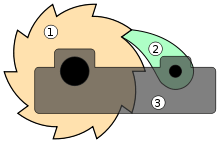Definify.com
Webster 1913 Edition
Pall
Pall
,Pall
,Pall
,Fades in the eye, and
Pall
,Pall
,Webster 1828 Edition
Pall
PALL
,PALL
,PALL
,PALL
,PALL
,Definition 2025
pall
pall
English
Noun
pall (plural palls)
- (archaic) Fine cloth, especially purple cloth used for robes.
- (Can we find and add a quotation of Wyclif Bible (Esther viii. 15) to this entry?)
- (Christianity) A cloth used for various purposes on the altar in a church.
- (Christianity) A piece of cardboard, covered with linen and embroidered on one side, used to cover the chalice.
- (Christianity) A pallium (woollen vestment in Roman Catholicism).
- Fuller
- About this time Pope Gregory sent two archbishop's palls into England, — the one for London, the other for York.
- Fuller
- (heraldry) A figure resembling the Roman Catholic pallium, or pall, and having the form of the letter Y.
- A heavy canvas, especially one laid over a coffin or tomb.
- 1942, Rebecca West, Black Lamb and Grey Falcon, Canongate (2006), page 150:
- Thirty years or so later, a woman was put to death for stealing the purple pall from his sarcophagus, a strange, crazy crime, […]
- 1942, Rebecca West, Black Lamb and Grey Falcon, Canongate (2006), page 150:
- An outer garment; a cloak or mantle.
- Shakespeare
- His lion's skin changed to a pall of gold.
- Shakespeare
- (obsolete) nausea
- (Can we find and add a quotation of Shaftesbury to this entry?)
- A feeling of gloom.
- A pall came over the crowd when the fourth goal was scored.
- The early election results cast a pall over what was supposed to be a celebration.
Derived terms
- cast a pall
- pallbearer
- tarpaulin
Synonyms
- (heraldry): pairle
Translations
Verb
pall (third-person singular simple present palls, present participle palling, simple past and past participle palled)
- To cloak.
- Lady Macbeth: Come, thick night, And pall thee in the dunnest smoke of **** (Macbeth Act I Scene v lines 48–9).
Etymology 2
Aphetism from appall. Possibly influenced by the figurative meaning of the unrelated noun.
Verb
pall (third-person singular simple present palls, present participle palling, simple past and past participle palled)
- (transitive) To make vapid or insipid; to make lifeless or spiritless; to dull; to weaken.
- Atterbury
- Reason and reflection […] pall all his enjoyments.
- Atterbury
- (intransitive) To become vapid, tasteless, dull, or insipid; to lose strength, life, spirit, or taste.
- The liquor palls.
- Addison
- Beauty soon grows familiar to the lover, / Fades in the eye, and palls upon the sense.
- 1918, Edgar Rice Burroughs, The Land That Time Forgot Chapter VI
- We are all becoming accustomed to adventure. It is beginning to pall on us. We suffered no casualties and there was no illness.
Albanian
Etymology
From Proto-Albanian *palei-, from Proto-Indo-European *(s)pel- 'to speak with a loud voice'. Cognate to Gothic spillon (spillon, “to proclaim”)[1].
Verb
pall (first-person singular past tense palla, participle pallë/pallur)
- To cry, hee-haw.
Related terms
References
- ↑ Albanische Etymologien (Untersuchungen zum albanischen Erbwortschatz), Bardhyl Demiraj, Leiden Studies in Indo-European 7; Amsterdam - Atlanta 1997, p.365
Estonian
Pronunciation
- IPA(key): /pˈɑlʲː/
Noun
pall (genitive palli, partitive palli)
Declension
This noun needs an inflection-table template.
Derived terms
Norwegian Bokmål
Etymology
From Old Norse pallr
Noun
pall m (definite singular pallen, indefinite plural paller, definite plural pallene)
- a pallet (portable platform on which goods are stacked for transport)
- a podium (especially for winners of a sporting event)
References
- “pall” in The Bokmål Dictionary.
Norwegian Nynorsk
Etymology
From Old Norse pallr
Noun
pall m (definite singular pallen, indefinite plural pallar, definite plural pallane)
- a pallet (portable platform on which goods are stacked for transport)
- a podium (especially for winners of a sporting event)
References
- “pall” in The Nynorsk Dictionary.
Swedish

Pronunciation
Noun
pall c
- a stool; a chair without armrests or a back
- (sports) a podium for prize ceremonies
- a pallet; a movable platform, constructed to be moved by forklifts
- a pawl (a pin in a ratchet gear)
- att stå pall
- to cope, to stand against pressure
- att stå pall
- (dated, slang) an apple
Declension
| Inflection of pall | ||||
|---|---|---|---|---|
| Singular | Plural | |||
| Indefinite | Definite | Indefinite | Definite | |
| Nominative | pall | pallen | pallar | pallarna |
| Genitive | palls | pallens | pallars | pallarnas |
Derived terms
- fotpall
- lastpall
- mjölkpall
- palla
- pallbrytning
- palldragare
- pallning
- pallplacering
- pallplats
- pallvagn
- prispall
- stå pall
References
- pall in Svenska Akademiens Ordlista över svenska språket (13th ed., online)